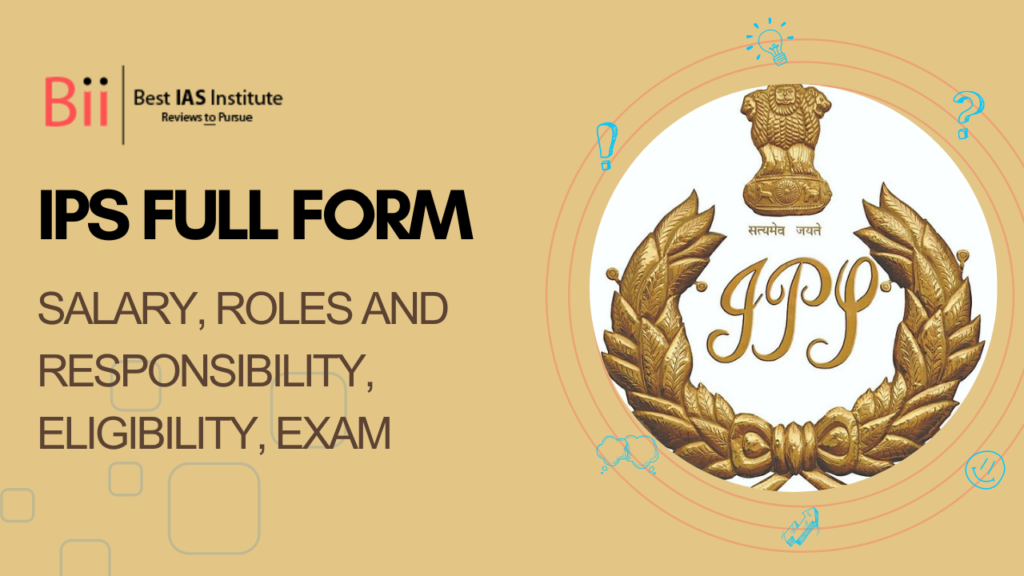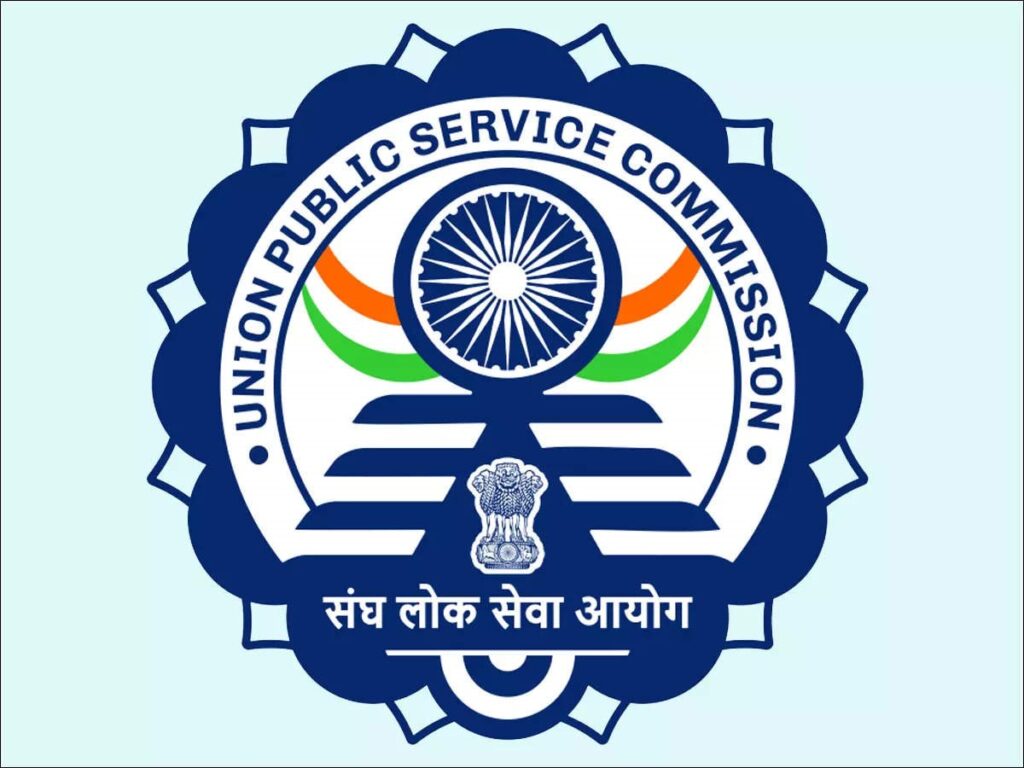What is IPS?

The full form of IPS is the Indian Police Service, which is one of the most prestigious and reupdated jobs in India after IAS. With a focus on law enforcement and public safety, the Indian Police Service (IPS) is responsible for maintaining law and order across the country. But what is the full form of IPS? In this article, we will decode IPS full form, its meaning in police, and more details about the IPS officer’s role.
| IPS Full Form | |
| IPC Full Form in English | Indian Police Service |
| IPC Full Form in Hindi | भारतीय पुलिस सेवा |
| Role | Maintaining law and order, Preventing and investigating crimes, and Ensuring public safety and security. |
History of IPS
Origin of IPS is from the British government, the Indian Councils Act of 1861 established a Superior Police Service in India, later renamed the Indian Imperial Police. The modern Indian Police Service was established under Article 312(2) of Part XIV of the Indian Constitution. The Indian Police Service (IPS) is a part of the executive branch and is one of three All India Services established by the Indian Parliament through the All India Services Act of 1951. An IPS officer ensures public safety by upholding law and order. They are also in charge of state and union territory police departments, CAPF forces (such as the CRPF, BSF, SSB, CISF, and ITBP) and the National Security Guards.
Roles and Responsibility of IPS
The IPS (Indian Police Service) comes under the Ministry of Home Affairs (MHA). The roles and responsibilities of the IPS officers are as given below in detail:
| Roles and Responsibility of IPS | ||
| S.no. | Major Roles | Sub Roles |
| 1 | Border responsibilities and duties | Counter-terrorismBorder policing |
| 2 | Maintaining public peace and order | Crime preventionThe investigation, detection and collection of intelligence |
| 3 | VIP security | – |
| 4 | Railway policing | – |
| 5 | Anti-smuggling and drug trafficking | – |
| 6 | Tackling Economic Offences | Corruption in public life |
| 7 | Disaster management | Biodiversity and protection/enforcement of environmental laws, etc |
| 8 | Enforcement of socio-economic legislation | – |
| 9 | High-level posts in the Indian | Intelligence AgenciesCBIR&AWIBCID |
| 10 | Leading and commanding the Indian Federal Law Enforcement Agencies | Civil and Armed Police Forces in all the union territories and statesCAPF – Central Armed Police Force |
IPS Officer Cadre Allocation
The IPS officers promoted from the state police services remain in their respective state cadres. For the successful candidates of the IPS exam (Civil Services Exam), the cadre allocation is done on the basis of their merit, rank, availability of vacancies and their preferences.Check the table below of IPS Cadre Allocation in a tabular form:
| Zone | Number of IPS Cadres | IPS Cadres Allocation |
| I | 7 | AGMUT (Arunachal Pradesh, Goa, Mizoram and UTs)Jammu and KashmirHimachal PradeshUttarakhandPunjabRajasthanHaryana |
| II | 4 | Uttar PradeshBiharJharkhandOdisha |
| III | 4 | GujaratMaharashtraMadhya PradeshChhattisgarh |
| IV | 6 | West BengalSikkimAssam-MeghalayaManipurTripuraNagaland |
| V | 5 | TelanganaAndhra PradeshKarnatakaTamil NaduKerala |
IPS (Indian Police Services) Recruitment and Eligibility
The recruitment of the IPS Indian Police Service officers is done with the help of Civil Services Examinations, which are conducted by the UPSC Commission. While filling up the application form, the candidate needs to choose the preferences for IPS or IAS as many IAS Toppers first preference is IAS and second is IPSC.UPSC releases the same application form for both posts. However, the applicants will be assigned to the training as per their obtained rank and preferences after clearing the rounds and stages of UPSC exam. Let’s us discuss the information about UPSC CSE exam.
- UPSC (Civil Service Examination)-
The UPSC (Civil Service Examination) is also known as IAS ,It is a national competitive examination in India conducted by the Union Public Service Commission for recruitment to higher Civil Services of the Government of India, including the Indian Administrative Service, Indian Foreign Service, and Indian Police Service. UPSC CSE examination is the most toughest examination in India conducted by UPSC.
| Name of examination | UPSC CSE |
| Conducting body | UPSC |
| Mode of exam | Offline (Pen or Paper Mode) |
| Number of Times Conducted Per Year | 1 (one) |
| Age Limit | 21 – 32 years (upper age relaxation for reserved candidates) |
| Exam Level | Moderate to Tough |
| Pattern of Examination | Prelims (MCQs), Mains (Descriptive papers)and interview |
| IAS Prelims 2024 | Sunday – 26th May 2024 (Prelims 2023 was on 28th May 2023) |
| IAS Mains 2024 | 20th September 2024 onwards (exams for five days) |
Eligibility Criteria of IPS
To become an IPS (Indian Police Service) officer in India, aspirants must meet the Education ,Age, Nationality,etc criteria set by the UPSC and clear the IPS exam (Civil Services Exam).
The IPS eligibility conditions and qualification criteria are:
- Nationality – Must be an Indian citizen, and belong to India.
- Age Limit – Minimum age of 21 years, maximum age varies, age relaxation depending on category and benchmark physical disability.
- Minimum Educational Qualification – Must br University degree (Graduate) from a recognized University.
- Number of Attempts – As for now,6 attempts for General category & EWS (Relaxation in Attempts for other categories except General).
- Restriction on Applying – Officers already appointed to the IAS or IFS aren’t eligible.
- Physical Standards – As per the Rules for Examination.
Salary of IPS Officer – 7th Pay Commission
Salary of IPS,According to the 7th Pay Commission, the civil service pay grade structure has been phased out, and the aggregation pay level has already been implemented. As a result, the IPS pay scale is based only on the basic salary plus TA, DA,HRA and other allowances. . The basic starting salary can start from Rs. 56,100 per month.
| Designation or IPS rank in State Police/Central Police Force | Salary as per 7th Pay Commission |
| Director-General of Police | 2,25,000.00 |
| Additional Director General of Police | 2,05,400.00 |
| Inspector-General of Police | 1,44,200.00 |
| Deputy Inspector General of Police | 1,31,100.00 |
| Senior Superintendent of Police | 78,800.00 |
| Additional Superintendent of Police | 67,700.00 |
| Deputy Superintendent of Police | 56,100.00 |
IPS Officer Salary Per Month
The monthly salary of an IPS officer at the entry level and the per month salary of an IPS officer at the highest level given below in a tabular form:
| Level | Basic Pay |
| Entry level (starting salary) | Rs 56,100 |
| Maximum Pay | Rs 2,25,000 |
Conclusion
The Full Form of IPS is Indian Police Service is discussed in detail and brief . In this article we have mentioned the 7th pay Commission salary, Monthly salary, roles and responsibility, eligibility criteria and cadre allocation for IPS Officer. .The elite Indian Police Service is not a security force but provides commanders to take higher-level posts in the state police machinery and the Central Armed Police Forces (CAPF). IPS officers can be employed by the Central Government and the respective States. IPS officers in India carry a lot of responsibility and also enjoy significant perks.



